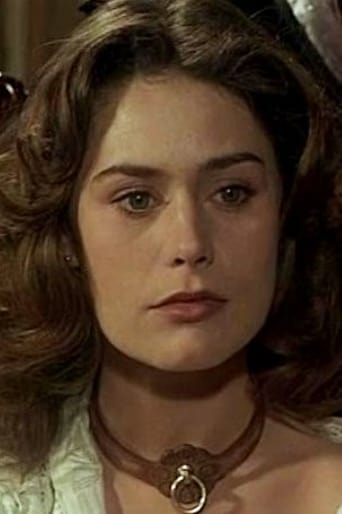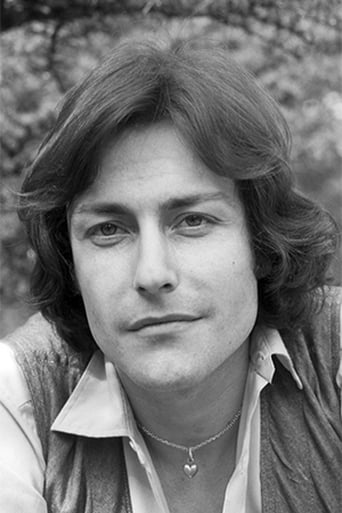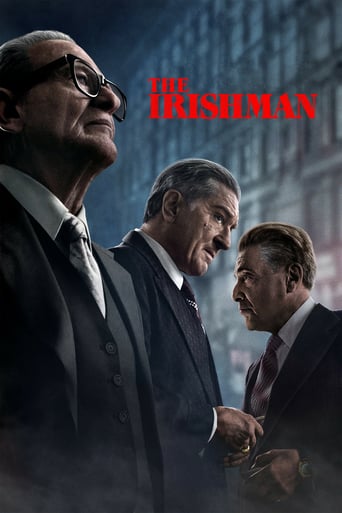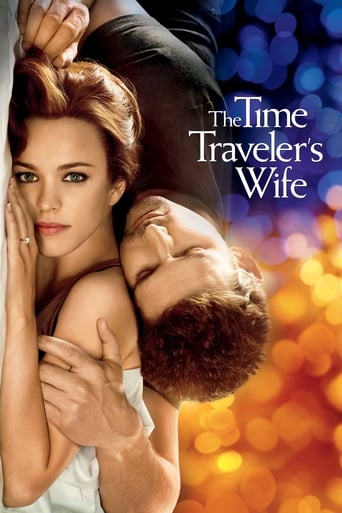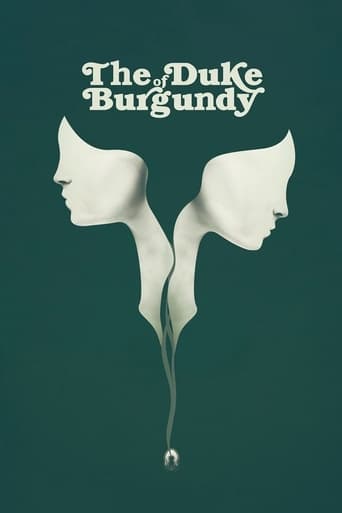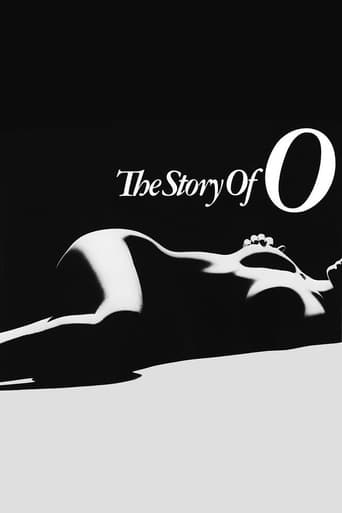
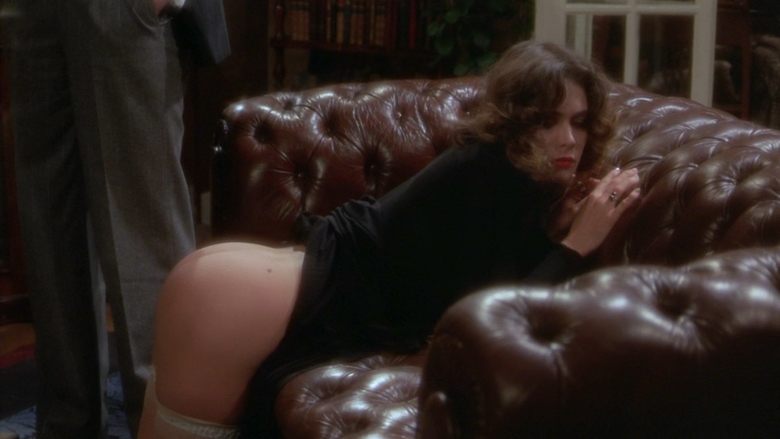
The Story of O (1975)
The beautiful O is taken by her boyfriend, Rene, to a bizarre retreat, where she is trained in bondage and sexual perversion...
Watch Trailer
Cast
Similar titles


Reviews
Absolutely Fantastic
It's complicated... I really like the directing, acting and writing but, there are issues with the way it's shot that I just can't deny. As much as I love the storytelling and the fantastic performance but, there are also certain scenes that didn't need to exist.
This story has more twists and turns than a second-rate soap opera.
Although I seem to have had higher expectations than I thought, the movie is super entertaining.
This movie gets points for the cinematography and the settings - the castle looks fantastic. Rather than a porno movie, this is more like a story about S & M, and bondage and obedience. There is a lot of female nudity, but no male frontal nudity.The story follows O, a French woman who is taken to a castle by her boyfriend, where she is initiated into submission. Right there I have a problem with the story, because she is suffering through all this to please her boyfriend, played by Udo Kier - now in 1975 Kier looked gay, gay, gay, so why would a woman do all these things for such a gay guy?The random sex maybe typical of porn, but is not necessarily a turn on - one interesting contrast between American porn and French porn is that all the French actresses had small flabby breasts - now you never see that in American porn - American women should be proud of their large, aggressive breasts! The story is more like a male fantasy - this movie would have been better if done with a sense of humor - the fact that this movie takes itself so seriously makes some parts of the story unbelievable. This movie will provide you with some strange entertainment on a rainy night. Just don't expect too much from it.
I am commenting this movie after 32 years lol. (and please forgive my bad English and try to understand me..) I saw it first in 1976, but recently I had the opportunity to see it again, and a lot of particulars I didn't noticed in my boyhood jumped out of the screen today.At first, don't look at the trial O has to face.. the story is about the relationship and the power.. if you think that O was the weak one, you didn't noticed how the story ends..I call this behaviour "topping from the bottom" Every relationship has a balance of power, and usually is not in equilibrium.Going back to the movie (please, remember was filmed in 1975!)superb photography, appropriate music.A detail I noticed after 32 yrs.. when O is bringed into the room, at the beginning, the other girl guide her having a hand over her shoulder.. first act of submission.Of course, the argument is not for all..
Following his spectacular commercial as well as begrudging critical success with the landmark EMMANUELLE, photographer turned filmmaker Just Jaeckin tried his hand at another erotic literature adaptation. Published in 1954, "Histoire d'O" caused an immediate scandal which drove the curious to the book stores with its single-minded first person account of a young woman's voluntary debasement to please her insecure lover, evolving into a more equally based power relationship with the sophisticated elderly mentor to whom she is passed on. Its author "Pauline Réage" was clearly pseudonymous and who was really responsible proved a fertile source for speculation, a particularly persistent possibility being idiosyncratic director Alain Robbe-Grillet who would dabble (with wife Catherine, under the joint "nom de plume" Jean de Berg) in the S&M field with "L'Image", ironically also filmed that year in a beautiful borderline hardcore version by Radley Metzger. Finally, the culprit came clean herself for, yes, it indeed was a woman in 1992, revealing herself to be respected writer and translator Dominique Aury (whose real name was Anne Desclos), who had penned the novel as an angst-ridden love letter to her considerably older paramour Jean Paulhan, an esteemed member of the Academie Française, whose sophistication both overwhelmed and terrified her. Retaining much of the book's matter of fact prose through effective voice over, supplying the voice "O" willingly surrenders, HISTOIRE D'O proves Jaeckin's high watermark as an erotic entrepreneur.Never given a proper character name beyond the single letter she adopts with implications of both nothingness and infinity, "O" (engagingly portrayed by exquisite Corinne Cléry, memorably ripped apart by Dobermanns in minor Bond MOONRAKER) humors lover René (cult favorite Udo Kier) by accepting an extended stay at the Château of Roissy, a secluded environment designed for the education of women by their own volition, stressed at every turn into a life of submission as the ultimate expression of love. Dressed in flowing robes that allow easy entry to whoever feels so inclined, "O" becomes part of a silent sisterhood whose utter servitude instills them with innate strength, available to all men yet belonging to none. Her personal manservant Pierre (longtime character actor Jean Gaven, impressive as one of the assumed villains in Jean Becker's masterpiece L'ETE MEURTRIER, coincidentally another film relying on extensive narration to get its point across) doles out daily punishment but relinquishes his power when he falls in love with his charge.Her training complete, "O" returns to her real world occupation as fashion photographer, grooming stuck up model Jacqueline (gorgeous Li Sellgren, also in Jaeckin's MADAME CLAUDE) for René's benefit and a subsequent stay at Roissy. It soon becomes clear that "O" has already outgrown her only outwardly unconventional lover, summoned by his "tutor" Sir Stephen (former British matinée idol Anthony Steel, no stranger to "naughty" credits as he appeared in both of James Kenelm Clarke's Fiona Richmond vehicles HARDCORE and LET'S GET LAID) who has become intrigued by this strangely subservient girl wielding power over his pupil. Equipped with fearsome black housekeeper Norah (imposing Laure Moutoussamy, star of occasional gay pornographer Norbert Terry's COUCHE-MOI DANS LE SABLE ET FAIS JAILLIR TON PETROLE !), sophisticated Sir Stephen will push her boundaries even further, with the physical souvenirs (pierced labia and branded initials, again by her own choice) to prove it. To this end, he sends her to live with the deceptively kind Anne-Marie (a tremendous performance by Christiane Minazzoli, by then a mainstay in French films for over two decades) in a comforting girls only environment that would seem like a walk in the park after Roissy. Without men for distraction however, the women will dig their claws into each other for top spot in their mistress' favor. Watch for several skin flick starlets during this extended episode, like Albane Navizet (star of Jean-François Davy's LE DESIR a/k/a INFIDELITES), Nadine Perles (from Eddy Matalon's LA CHATTE SANS PUDEUR) and especially Martine Kelly as tomboy Thérèse. Not a soft porn siren per se, Kelly had totally charmed audiences in her debut as the Scottish lass coveted by Olivier De Funès in Jean Girault's affable LES GRANDES VACANCES. Over time, she would amass a consistently engaging body of work in movies as diverse as Samy Pavel's distinctly odd and now virtually impossible to see MISS O'GYNIE ET LES HOMMES FLEURS and the period melodrama LES MAL PARTIS by Sébastien Japrisot, who adapted novel to screenplay for "O". Coincidence ? It's amazing what a little okay, a lot of surface gloss could do to sneak contentious material past the censors circa 1975. One has to bear in mind that this played regular theaters rather than the "specialized circuit" and, literary pedigree notwithstanding, this is one diabolically dirty movie, even with most graphic components eloquently left to imagination. Revered DoP Robert Fraisse, who continues to work on both sides of the Atlantic to this very day (doing exemplary work on the Nick Cassavetes' ingratiating period piece THE NOTEBOOK for example), imbues the luxurious interiors with ominous grandeur in line with the dispassionate ritual approach Sir Stephen and his acolytes take to justify their apparently debauched goal, the dank coldness of Roissy contrasting effectively with the warm hues of the Anne-Marie segment. As with EMMANUELLE, late pop chart topper Pierre Bachelet contributes a richly varied score which proved a bestseller on vinyl, an obligatory auditory accoutrement in middle class households back in the day. Only slightly less successful than its predecessor, yet a far more ambitious and accomplished work, HISTOIRE D'O also proved something of a private obsession for producer Eric Rochat, who would return to the material time and again with a peculiar sequel (pretentiously subtitled CHAPITRE II, which he helmed himself) with Dutch actress Sandra Wey who was no Sylvia Kristel and a ten episode miniseries starring Brazilian bombshell Claudia Cepeda. Neither of these in any way tarnishes the ebullient effect the extremely erotic original still exudes over three decades down the line.
Occasionally during the 1950's and 1960's I and friends interested in literature and the arts would discuss a book, written anonymously in 1954 by a woman author using the name Pauline Reage, and commonly regarded as a very powerful work depicting submission as the route to a woman's fulfillment. This discussion was however largely based on hearsay - the book itself was not readily available in the U.K. where I was then living. We understood that a copy was available in the British Museum reading room for anyone who called themselves a scholar, but it was not regarded as suitable reading matter for ordinary folk, and no British publisher dared to publish it. When I eventually saw it on sale I was sufficiently intrigued to purchase a copy, and I quickly appreciated that the very deadpan and unemotional style of writing gave this work an extraordinary power which made it difficult to forget. Unlike most books, it was very hard to understand the author's motive in writing it, but the scenes of pain and humiliation it featured were so lucid that I assumed it would never be possible for this book to be filmed. I was therefore quite surprised when Just Jaeckin's film was released in France in 1975. Many years passed before this film was cleared by British censors for distribution in the U.K., and by then I was living in North America where I have seen it both in the cinema and on the First Choice television channel. The film features almost everything described in the book with remarkable accuracy, but it is depicted in such an unemotional and almost documentary manner that it is remarkably non-pornographic. SPOILER AHEAD. Right through history the wish to own and dominate women has been part of the masculine character, and this is brought out clearly in the literature of every age. However literature has not always made it equally clear that there is just as frequent a wish on the part of many women to be totally submissive. Such a woman often believes that however unreasonable the demands made on her by her dominant man, this behaviour will ultimately force him to truly love her. Artistically it is important to note that nothing which happens to 'O' in this film takes place before she is asked for, and has given, her consent. Voluntary, but total and completely passive submission is the theme of the film. There is one scene in the film which I found particularly effective. This is the Commander's ball just before the end which 'O' attends, naked except for a fabulous mask that makes her appear completely anonymous. Sir Stephen gives 'O' the chance to choose the mask she will wear, and she chooses one which is strongly suggestive of a bird of prey. The symbolism of this appears to be that, by their very submissiveness, these women are also preying on their men who become deprived of any opportunity to form any normal relationship with them; and may thereby be psychologically damaged almost as badly as their victims. Only right at the end of the film does any emotion break through, when Sir Stephen indicates to 'O' that her prolonged submission to pain and humiliation have won his love, and she responds by demonstrating the affection she feels for him for the first time. When this film was first shown in Paris it ran for thirteen years and I found it intriguing to read that more than half of most audiences were women. Clearly, even in these days of active feminism, the concept of attaining true love through a role of total submission has some appeal to a large number of women. This is the reality which has to be borne in mind by the viewer whenever watching this or any similar film. This is a film which many will watch for its curiosity value, but which will probably only appeals to a very small number. Within its limitations it is extremely well made, and it is certainly not pornographic. Although there is plenty of nudity there are no shots showing either male or female genitals, and no attempt is made to dwell on any of the violence just for titillation. Overall it probably deserves a reasonably high rating, unfortunately I cannot give it this. I am amazed at how accurately the scenes depicted in the film follow the written descriptions in the novel - it is obvious that its makers took a great deal of trouble to ensure this. My basic concern is that this disguises the fact the film completely reverses the message which the original novel appears to have been intended to convey. There were two different endings to the book which are still extant. Both involve Sir Stephen losing all interest in 'O' after he has completed humiliating her in every way he can. In one 'O' begs Sir Stephen to permit her to commit suicide - she would not do it without his explicit permission, but he grants her this. In the other she is returned to the training mansion to help teach her replacement what will be expected. Either of these endings convey the clear message that total submission does not lead to greater love but ultimately to contempt for the oversubmissive individual. Because it reverses this message; the film, however closely it may follow the book in other respects, is totally unacceptable to me.
